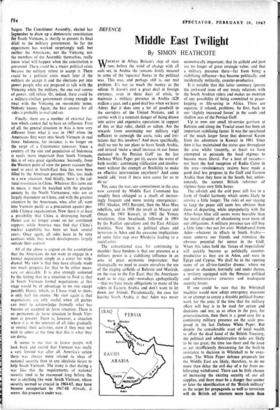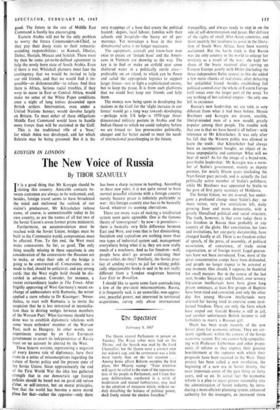Middle East Twilight
DEFENCE
By SIMON HEATH COTE
WHEREAS in Africa Britain's ship of state runs before the wind of change with all sails set, in Arabia she remains firmly moored to some of the 'squarest' buoys in the political seas. This was, and perhaps still is, our real problem. It's not so much the money as the odium. It doesn't cost a great deal in foreign currency, even in these days of crisis, to maintain a military presence in Arabia (f28 million a year, and a good deal less when we leave Aden). But it does cost a lot of goodwill in the corridors of the United Nations, and it carries with it a constant danger of being drawn into active and expensive operations in support of this or that ruler, sheikh or sultan. Are the rewards from continuing our military vigil sufficient to outweigh the costs, risks and irri- tations that this involves? And more specifically, shall we not by our plans to leave South Arabia, and instead 'make a small increase in 'our forces stationed in the Persian Gulf (as the last Defence White Paper put it), secure the worst of both worlds: continuing vilification and involve- ment without the strength or flexibility to make an effective intervention anywhere? And some would add, 'even if there were cause for us to do so.'
Yet, since the war, our commitment in the area now covered by Middle East Command has steadily been enlarged as a result of increas- ingly frequent and more testing emergencies: 1951 Abadan, 1953 Buraimi, then the Mau Mau rebellion, and in 1958 the revolt in Muscat and Oman. In 1961 Kuwait, in 1962 the Yemen revolution, then Swaziland, followed in 1964 by the Radfan operations and the East African mutinies. Now there is political chaos and terrorism in Aden and the awesome implications of some false step over Rhodesia leading to a racial crisis.
The conventional case for continuing to shoulder these burdens is that our presence as a military power is a stabilising influence in an area of great economic importance; that strategically we need to assure ourselves the use of the staging airfields at Bahrein and Masirah, on the way to the Far East; that the Americans want us to stay; and—nowadays apologetically —that we have treaty obligations to many of the rulers in Eastern Arabia and don't want to let down our friends. Paradoxically, the case for leaving South Arabia is that Aden was never economically important; that its airfield and port are no longer of great strategic value; and that a military presence there—far from being a stabilising influence has become politically, and incidentally militarily, counter-productive.
It is notable that this latter summary ignores the awkward issue of our treaty relations with the South Arabian rulers and makes no mention of any possibility of being committed to peace- keeping or life-saving in Africa. These are separate, if related, problems. So first, back to our 'slightly increased forces' in the sands and shallow seas of the Persian Gulf.
Up to now our small tri-service garrison at Bahrein and along the Trucial coast has been an important stabilising factor. It was the spearhead of the much larger force that deterred Kasim from his adventure in Kuwait in 1961. Since then it has maintained the status quo throughout the area whilst (recently, at least) we have attempted to persuade the local regimes to
become more liberal. For a host of reasons—
not least the bad reception of Radio Cairo in the area—revolutionary zealots have made a good deal less progress in the Gulf and Eastern Arabia than they have in the South, but, unfor- tunately, the earnest British reformer of regimes fares very little better.
The oil-rich and the arid poor still live in a form of feudal harmony which seems likely to survive a little longer. The risks of our staying to keep the peace still seem less obvious than those of departing, while unpopularity with the Afro-Asian bloc still seems more bearable than the moral disquiet of abandoning even more of our obligations. A military presence can still buy a little time—but not for ever. Withdrawal from Aden—whatever its effects in South Arabia— must unnerve our friends and stimulate the obvious potential for unrest in the Gulf.
When this takes hold the 'forces of imperialism' will quickly become as politically counter- productive as they are in Aden, and were in Egypt and Cyprus. We shall be in the opening scene of an all-too-familiar drama: where we appear to abandon, hurriedly and under duress, a territory equipped with the flimsiest political and administrative structure and inadequate- security forces.
If one could be sure that the Whitehall machine would now adopt emergency measures in an attempt to create a durable political frame- work for the area; if the time that the military effort will buy is to be used for action and decisions and not, as so often in the past, for procrastination, then there is a good case for a continuing military presence on the scale pro- posed in the last Defence White Paper. But despite the considerable asset of local wealth to offset the dead hand of the British Treasury, the political and administrative tasks are likely to be too great, the time too short and the issue as yet insufficiently threatening for the built-in
resistance to decision in Whitehall to be over- come. The White Paper defence proposals for the Middle East are likely, therefore, to do no more than delay the evil day of a far from ex- hilarating withdrawal. There can be little chance of increasing the existing security of our oil supplies, and there must be a danger that sooner or later the identification of the 'British military' as the target for propaganda as well as terrorism will do British oil interests more harm than
good. The future in the rest of Middle East Command is hardly less encouraging.
Eastern Arabia will not be the only problem to worry the future Commanders-in-Chief, as they pay their dusty visits to their romantic- sounding responsibilities: to Kuwait, Dhofar, Dubai, Sharjah, Muscat and Salalah. There must by then be some yet-to-be-defined agreement to help the newly born state of South Arabia. Even if there is not, Whitehall planners must face the contingency that we would be invited to help our old friends, and that we would find it im- possible—or dishonourable—to refuse. And then there is Africa. Serious racial troubles, if they were to occur in East or Central Africa, would make no sense of the White Paper conditions once a night of long knives descended upon British settlers. Intervention, even under a United Nations banner, would devolve largely on Britain. To meet either of these obligations Middle East Command would have to handle more troops than will be stationed in the Gulf.
This is the traditional role of a 'base,' for which Aden was developed, and for which Bahrein may be being groomed. But it is the
very trappings of a base that create the political hazard : depots, local labour, families with their schools and hospitals—the heavy air of per- manence. Yet nowadays a base in this two- dimensional sense is no longer necessary.
The equipment, aircraft and know-how now exist to create an 'instant base' and the Ameri- cans in Vietnam are showing us the way. The key is to find or make an airfield near some sheltered water in a politically sterile area— preferably on an island, to which can be flown and sailed the appropriate logistics to support larger forces—not to fight a sophisticated enemy, but to keep the peace. It is from such platforms that we could best keep our friends and help them.
The money now being spent in developing the stations in the Gulf for the 'slight increase in our forces' would go a long way towards developing —perhaps with US help—a 1970-type three- dimensional military posture in Arabia and the Indian Ocean to which we could redeploy before we are forced to: less provocative politically, cheaper and far better suited to meet the needs of international peacekeeping in the future.



































 Previous page
Previous page